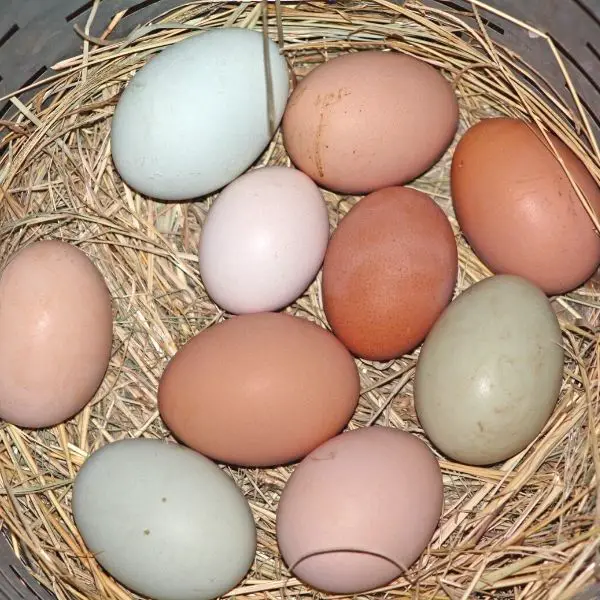How to tell if an egg is bad or good may seem a silly question to you. You may even wonder why anyone would need to ask since most people gather their eggs every day. If you have ever opened a rotten egg, you will never want to do that again. Learn the three best tests to check your eggs.

There have been two situations that caused me to need to determine if the eggs were fresh or not.
The first situation was when my Black Australorp hen, Mammie, had been setting for about 16 to 17 days. I noticed she had rolled three eggs out of her nest.
I knew she would do that if the eggs were bad, but me being me I thought “Well, she might not have meant to do that. Maybe she was just turning them and they flipped out.” So…I put the eggs back.
The next day she had two of them out again. So I decided to check them and sure enough, they were rotten.
The second was when about half of my free-ranging flock was young hens, I thought they would see the older hens go back to the nest to lay and follow suit. Of course, they didn’t.
One day we were out moving some limbs and surprise! We found a nest of about 26 eggs. I had no way of knowing how long those eggs had been there, so I had to determine which were good and which were bad.
Three Tests to Determine if an Egg is Fresh

The Float Test
- Fresh eggs will lie on their sides on the bottom of the bucket.
- When an egg is a few days old, it will have one end that tips upwards at a slant
- If it is stale, it will stand on its end
- If the egg is rotten, it will float to the top.
Any egg that floats in any way, shape, or form, I call it rotten. The way this works is that the air space at the large end of the egg enlarges as the egg ages and that airspace causes it to float.
Once you’ve performed this test, the bloom will have been washed off the egg. This means you will need to refrigerate the egg until you use it.
You can learn more about egg washing and storage and more in our egg-related articles.

The Bowl Test
The bowl test is considered to be the simplest way to determine the freshness of an egg. It’s simply cracking the egg into a small bowl and examining it before use.
Usually, a rotten egg can be determined without completely breaking the shell. It’s harder to crack because the membrane has become tough. It will smell bad even from the outside and just as you barely crack it, stinky thick rottenness will ooze out.
Some eggs are harder to determine by examining them and you just have to use the bowl test.
You’re bound to get surprised from time to time. One that may look dirty and old will turn out to be fresh and one that looks fresh will turn out to be old.
If you see blood spots or brown spots in the egg, this is natural and does not indicate that an egg is bad.
If I crack open one that doesn’t have a funny smell, has good color, and the egg white is clear, I go ahead and use it. But always use the mantra, “If in doubt, throw it out.”
If you’re checking more than one egg at a time, be sure to wash the bowl really well if a rotten one is found or use a new bowl.
One time my grandmother was cracking eggs and an undeveloped chick plopped out into the skillet. It was gross and smelled horrible. She said, “Well, that’s why I should be using a bowl test.”

It is hard to tell in the photo, but this egg is fresh.
- The yolk is in the middle, not moving much, and the airspace is small.
- The candle test is the most reliable way to determine if it’s fresh or rotten according to the old-timers. They tested them with a candle, that’s how the test got its name.
The same effect is achieved by shining a powerful light through the egg while in a dark room. You can buy a candling station, but a good flashlight or even a candle will work in a dark room.
- Remember that the darker the eggshell, the harder it is to see.
There is no way to tell if an egg is fertile or not without candling it. If the egg is fertile, you will see a spider-like formation which is the blood vessels forming. Personally, I don’t candle to determine fertility.
To perform the candle test
- Shine the light source next to the large end of the egg and you will see the inside of the shell illuminated.
- If the contents do not fill the shell, the egg is not exactly fresh.
- The larger the air pocket, the older the egg.
- In a fresh egg, the yolk doesn’t move about freely because the air space is small. In an older egg, the yolk will move around more freely.
There you have it, the three best ways to tell if an egg is fresh or rotten. Personally, I’ve always used the float test and I’ve never had a problem.
Have you ever had a situation where you needed to determine if an egg was fresh or not? How about an experience with rotten eggs? I hope you find these tips useful.
As always, we’re here to help.

lol…your grandma made me laugh! We had that last spring when my son decided to collect all the eggs because the hen stopped sitting on them (she was getting water when he went to collect…ahem).
Oh my Angi, I can just imagine! Thanks for stopping by with a comment.
Your story was really inefvmatiro, thanks!
Xaria, Thank you. I had to look up inefvmatiro to see it meant informative 🙂 You taught me something today! Thanks.